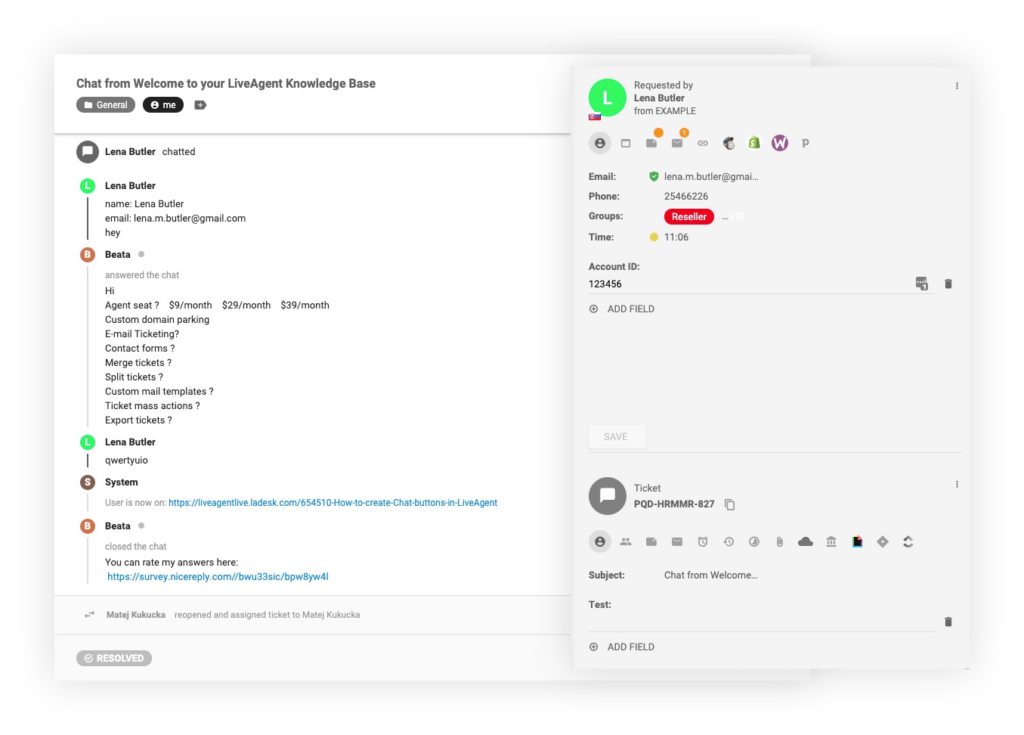What is CRM?
CRM stands for customer relationship management. It is a summary of strategies and technologies that help your business establish and maintain relationships with both potential customers and returning clients. It aids in contact management with an emphasis on catering to customer preferences and boosting sales productivity.
To achieve amazing customer relationships, companies use CRM software. This software collects customer data, customer interactions, records, trends, etc., and adds them to customer profiles.
This way your sales reps, contact center agents, and marketing teams, can access all the relevant information before making a contact. This not only boosts sales productivity but also helps streamline the sales process and helps your business exceed customer expectations.

Who can use CRM?
All customer-centric businesses interested in furthering customer relationships and driving sales should consider using CRM. Various departments and teams can benefit from utilizing it daily. CRM is most useful when collecting and categorizing leads, carrying out analyses, making sales calls, providing customer support, and more.
Call center software CRM integration plays an important role in every business as it provides information and data about your customers for better customer service.
Benefits of CRM
CRM is a wonderful tool that helps many businesses across the globe. These are the ways it can add value to your business.
- Improved customer relationships – When your customer service representatives have all the customer data at their fingertips, they can provide a higher level of personalized care which helps build customer loyalty, boosts retention and enhances the overall customer experience.
- Increased sales – CRM helps streamline the sales cycle, build an effective sales pipeline, and automate important tasks using artificial intelligence and other software tools.
- Better customer service – Providing excellent customer service is a much easier task when your agents have all the information they need readily available. Whether it is an order number, preferred communication channels, or personal details, your agents can store it and pull it up at any point in customer journeys.
- Convenient centralized database of customer information – There are many inherent benefits to having a centralized database anybody can access whenever needed. Besides accessible knowledge, CRM allows for better inter-departmental collaboration as all teams have access to the same, unified information.
- Better customer segmentation – With CRM, you can break down otherwise overwhelming amounts of information into categories based on predefined criteria. Customer segmentation helps you develop effective marketing campaigns, personalize sales pitches, and boost your overall business performance.
- More detailed analytics – When you have an abundance of data about your customers, you can create detailed, highly-accurate reports. Knowledge is power, so the more you can analyze and learn from this data, the better for your business.
How to choose CRM software
When choosing CRM software, we recommend carrying out thorough research and consider your business goals and needs. Ensure the software is scalable, user-friendly, and easily adopted by your team. Evaluate its pricing based on your budget and read customer reviews in order to make an informed decision. All these factors can help you choose the right software to drive your business growth.
There are some features a reliable CRM software should have, including multichannel communication, ticketing tool, customer service automation options, a large number of third-party integrations, reporting, and customization.
Key features of a reliable CRM software
Multichannel communication allows businesses to interact with customers through various channels such as email, live chat, and social media. This ensures that customers can reach out through their preferred channel, enhancing convenience.
CRM ticketing tool is another crucial feature because it enables to efficiently manage customer inquiries, issues, and requests. It automatically converts customer interactions into tickets, making it easier to track, assign, and resolve them.
Customer service automation helps to automate repetitive tasks and workflows, saving time and improving efficiency. Automation tools streamline customer service processes and free up agents so they can focus on more complex tasks.
Integrations allow businesses to connect their CRM software with other third-party tools and systems. This integration capability enables businesses to centralize data, streamline processes, and gain comprehensive insights into customer interactions.
Reporting capabilities can track performance and identify areas for improvement. CRM software should provide reporting features that allow businesses to analyze customer data, track sales, and evaluate the effectiveness of campaigns.
Customization is essential as businesses have their unique needs and requirements. A reliable CRM software should offer customization options, allowing businesses to tailor the system to their specific needs to ensure that they can adapt the CRM software to their processes and workflows.
A good example of a robust and reliable CRM software for both small businesses as well as large enterprises is LiveAgent help desk software.
Looking for better CRM solutions?
Manage your relationships straight from your help desk software. LiveAgent can integrate with the most popular CRM software and help you improve your workflow.
Watch introduction video to CRM
Explore the fundamentals of customer relationship management (CRM) in this informative video. Gain insights into the strategies and techniques used by organizations to effectively manage customer interactions and relationships. This video serves as a comprehensive resource for aspiring CRM professionals. Dive into the technicalities and best practices of CRM, and embark on a journey towards mastering this vital discipline

Topics
- CRM platforms
- Efficient data management
- Streamlining processes
Video summary
The video discusses how businesses can efficiently manage customer data using CRM (Customer Relationship Management) platforms. These platforms can streamline processes, increase productivity, and improve customer experiences, ultimately leading to increased revenue and customer retention. The video also explains what CRM is and how it works. The discussed topics include the benefits of CRM platforms, the types of businesses that can use them, cloud computing, back-end operations, and the various functions that CRM software can offer, such as data management, sales automation, analytics, and creating a single database for client information.
Frequently Asked Questions
What is the importance of CRM in customer service?
Customer Relationship Management (CRM) helps businesses effectively manage and analyze customer interactions and data throughout the customer lifecycle. CRM systems allow businesses to track customer preferences, purchase history, and communication preferences, which enables them to provide personalized and targeted customer service.
What does the acronym CRM stand for?
The acronym CRM stands for customer relationship management. CRM software allows companies to collect, store, analyze, and work with customer data from one centralized database in the form of customer profiles. It is a part of business processes that aid in making customer-focused decisions.
How does CRM enhance customer experience?
CRM provides a centralized platform for businesses to store and manage customer data. This allows them to gain insights into customer preferences and interaction history, enabling them to personalize communication and address customer needs more effectively. CRM systems also help streamline internal processes, simplify collaboration, and improve customer service which ultimately leads to more positive customer experience.
What are the types of CRM?
There are several types of CRM. The first is operational CRM, which is used in bettering customer service. The second type is a collaborative CRM that supports interactions with suppliers and distributors. Another type is analytical CRM, which lets you analyze data and make informed decisions. The fourth type is a strategic CRM, which uses customer data and current trends to drive sales and enhance customer experience. The last type is CRM used for campaign management which allows you to develop and execute marketing and sales campaigns effectively.
Is LiveAgent a CRM?
LiveAgent has a built-in CRM software that allows you to store, analyze, and use customer data to not only improve your bottom line but also develop a loyal customer base.
![Expert badge]() Expert’s note
Expert’s note
CRM stands for customer relationship management, and it can help businesses improve customer relationships, increase sales, and streamline processes through a centralized database of customer information.

Mastering Customer Relationship Management | Concept, Types, Objectives, Advantages
The TEXT discusses the importance of digital marketing, customer testimonials, and customer relationship management (CRM) in driving business growth and profitability. It emphasizes the need for personalized interactions, data-driven decision-making, and the use of social media and email marketing to reach a wider audience. It also highlights the challenges and advantages of implementing CRM systems.
Campaign management CRM is essential for targeting customer needs and boosting sales. When choosing CRM software, consider features like multichannel communication, contact management, automation, third-party integration, reporting analysis, and customization. Pricing varies from $12 to $300 per user per month. Top CRM software options include LiveAgent, Hubspot, Keap, Freshworks, and Zoho, each offering unique features and pricing plans.
10 Best knowledge management system examples
Building a strong brand is crucial for business growth. Google aims to improve search results with Magi update. Effective social media marketing strategies include lead generation, nurture, and conversion. AI tools aid digital marketing efforts. Knowledge management processes support strategic planning and foster a culture of continuous learning and innovation. LiveAgent and Notion are top-rated knowledge management system examples. TalentLMS offers a robust learning management system. Azure Machine Learning Studio empowers businesses to leverage the power of AI. Pipedrive is a popular CRM system, and monday.com is a powerful project management system. Facebook is a widely used social networking platform for businesses. Document management systems and collaboration tools streamline document workflows and enable teams to work together effectively.

 Български
Български  Čeština
Čeština  Dansk
Dansk  Deutsch
Deutsch  Eesti
Eesti  Español
Español  Français
Français  Ελληνικα
Ελληνικα  Hrvatski
Hrvatski  Italiano
Italiano  Latviešu
Latviešu  Lietuviškai
Lietuviškai  Magyar
Magyar  Nederlands
Nederlands  Norsk bokmål
Norsk bokmål  Polski
Polski  Română
Română  Русский
Русский  Slovenčina
Slovenčina  Slovenščina
Slovenščina  简体中文
简体中文  Tagalog
Tagalog  Tiếng Việt
Tiếng Việt  العربية
العربية  Português
Português 
 Expert’s note
Expert’s note




